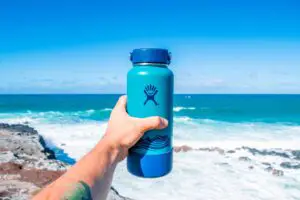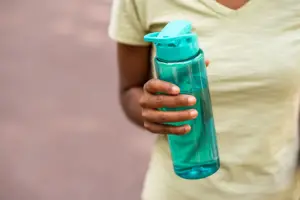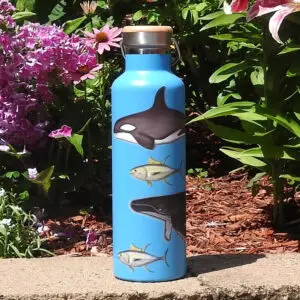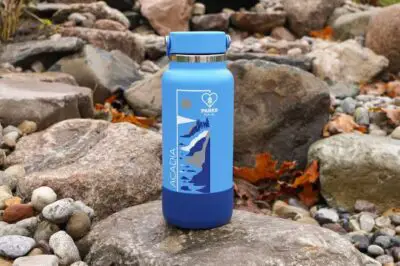Water is an essential component of human life, and staying properly hydrated is important for maintaining good health. One common measurement of water is ounces or oz. So, how much is 32 oz of water, and why does it matter? In simple terms, 32 oz of water is equivalent to four cups or one quart.
Drinking enough water each day is important for staying hydrated and maintaining bodily functions, such as regulating body temperature, lubricating joints, and transporting nutrients throughout the body. In this article, we’ll explore the importance of staying hydrated and provide tips for drinking enough water each day.
What is 32 oz of Water?

32 oz of water refers to a volume of water that measures 32 fluid ounces. In simple terms, 32 oz of water is equivalent to four cups or one quart. Drinking enough water each day is important for staying hydrated and maintaining bodily functions.
The amount of a person needs to drink each day can vary based on factors such as age, gender, activity level, and climate. However, a general guideline for daily water intake is to drink at least 8 cups or 64 oz of water per day. By drinking enough water each day, you can help prevent dehydration and promote overall health and well-being.
Understanding Fluid Intake and Hydration Needs
Fluid intake is an important aspect of maintaining good health, as water is essential for many bodily functions. Staying hydrated is especially important for athletes, people who work outdoors in hot weather, and those who are ill. Hydration needs can vary based on age, gender, weight, and activity level.
The National Academies of Sciences, Engineering, and Medicine recommend that men consume an average of about 3.7 liters (or about 13 cups) of water per day, while women consume an average of about 2.7 liters (or about 9 cups) of water per day. However, these amounts can vary based on individual needs.
In addition to drinking water, other beverages and foods can contribute to fluid intake. Examples include fruit juices, milk, tea, coffee, and soups. It’s important to note that certain beverages, such as sugary drinks and alcohol, can have negative health effects and should be consumed in moderation.
Dehydration can have negative effects on the body, including headaches, fatigue, dizziness, and decreased cognitive function. To prevent dehydration, it’s important to drink enough fluids throughout the day, especially during periods of increased physical activity or hot weather.
Measuring Water: Ounces, Liters, and Milliliters
Water is an essential component of human life, and measuring water accurately is important for maintaining proper hydration. There are several units of measurement commonly used for water, including ounces, liters, and milliliters.
Ounces are a common unit of measurement used in the United States. One fluid ounce is equivalent to approximately 29.6 milliliters. Therefore, 8 fluid ounces of water is equivalent to approximately 236 milliliters.
Liters are another unit of measurement commonly used for water. One liter is equivalent to 33.8 fluid ounces or approximately 1,000 milliliters. Therefore, 2 liters of water is equivalent to approximately 67.6 fluid ounces or 2,000 milliliters.
Milliliters are the most precise unit of measurement commonly used for water. One milliliter is equivalent to 0.03 fluid ounces or approximately 0.001 liters. Therefore, 500 milliliters of water is equivalent to approximately 16.9 fluid ounces or 0.5 liters.
It’s important to understand the different units of measurement for water to ensure accurate hydration. Drinking enough water each day is important for maintaining bodily functions, such as regulating body temperature, lubricating joints, and transporting nutrients throughout the body.
Therefore, by measuring your water intake accurately, you can help ensure that you’re drinking enough water each day to stay hydrated and maintain good health.
How Many Cups is 32 oz of Water?
32 oz of water is equivalent to 4 cups. One cup of water is equivalent to 8 fluid ounces, so 4 cups of water would be equal to 32 fluid ounces. Drinking enough water each day is important for staying hydrated and maintaining good health.
The recommended daily water intake can vary based on factors such as age, gender, weight, and activity level, but a general guideline is to drink at least 8 cups or 64 oz of water per day. By measuring your water intake accurately, you can help ensure that you’re drinking enough water each day to stay properly hydrated.
How Much Water Do You Need Daily?

The amount of water a person needs to drink each day can vary based on several factors, including age, gender, weight, activity level, and climate. However, a general guideline for daily water intake is to drink at least 8 cups or 64 ounces of water per day.
This recommendation is based on the fact that water is essential for many bodily functions, such as regulating body temperature, lubricating joints, and transporting nutrients throughout the body. Staying hydrated can also help prevent dehydration, which can lead to negative health effects such as headaches, fatigue, dizziness, and decreased cognitive function.
However, it’s important to note that individual water needs can vary based on factors such as age and activity level. For example, athletes or people who work outdoors in hot weather may need to drink more water to replace fluids lost through sweat. Pregnant or breastfeeding women may also need to consume more water to support fetal and infant growth.
To determine your individual water needs, you can use the general guideline of at least 8 cups or 64 ounces of water per day as a starting point and adjust based on your individual circumstances. You can also consult with a healthcare provider for personalized recommendations.
How Much Water is Enough for Athletes and Active Individuals?
Athletes and active individuals often need to consume more water than the general guideline of at least 8 cups or 64 ounces per day to maintain proper hydration. This is because physical activity can increase fluid loss through sweat, and proper hydration is important for maintaining performance and preventing negative health effects such as heat exhaustion and dehydration.
The exact amount of water an athlete or active individual needs to consume can vary based on factors such as the duration and intensity of the activity, as well as individual factors such as age, gender, weight, and sweat rate. However, a general guideline is to drink at least 1/2 to 1 ounce of water per pound of body weight per day.
For example, a 150-pound athlete would need to drink at least 75 to 150 ounces (or approximately 9 to 18 cups) of water per day. During exercise, athletes should aim to drink water before, during, and after activity to maintain proper hydration levels.
In addition to water, athletes may also benefit from consuming sports drinks or other electrolyte-replenishing beverages during intense or prolonged activity, as these can help replace fluids and nutrients lost through sweat.
It’s important for athletes and active individuals to monitor their hydration levels and adjust their fluid intake as needed to prevent dehydration and maintain optimal performance. A healthcare provider or sports nutritionist can provide personalized recommendations for fluid and electrolyte intake based on individual needs and activity levels.
The Risks of Dehydration and Water Deficiency
Dehydration occurs when the body loses more fluids than it takes in. This can lead to a range of negative health effects and can be particularly dangerous for athletes and active individuals.
Mild dehydration can cause symptoms such as thirst, dry mouth, and dark urine. As dehydration worsens, symptoms can progress to include headaches, fatigue, dizziness, and even confusion. Severe dehydration can lead to heat exhaustion or heat stroke, which can be life-threatening.
In addition to the immediate health risks, chronic dehydration can have negative effects on overall health and well-being. It can lead to problems such as constipation, urinary tract infections, and kidney stones. In older adults, chronic dehydration has been associated with an increased risk of falls and cognitive impairment.
Water deficiency can also impact athletic performance. Even mild dehydration can lead to a decrease in endurance, strength, and overall athletic performance. It can also increase the risk of muscle cramps, heat exhaustion, and heat stroke.
To prevent dehydration and water deficiency, it’s important to drink enough fluids throughout the day, especially during periods of physical activity. Water is generally the best choice, but sports drinks or other electrolyte-replenishing beverages can also be helpful during intense or prolonged activity.
Monitoring urine color is a simple way to check hydration levels. A pale yellow or clear color indicates proper hydration, while a darker color suggests dehydration. Athletes and active individuals should also weigh themselves before and after exercise to determine fluid loss and adjust their fluid intake accordingly.
Overall, staying properly hydrated is essential for good health and optimal athletic performance.
How to Calculate Daily Water Needs Based on Body Weight

To calculate your daily water needs based on your body weight, you can use the general guideline of consuming 1/2 to 1 ounce of water per pound of body weight per day. Here’s an example:
- Determine your body weight in pounds.
- Multiply your body weight by 0.5 to get the minimum recommended daily water intake in ounces.
- Multiply your body weight by 1 to get the maximum recommended daily water intake in ounces.
For example, a person who weighs 150 pounds would follow these steps:
- 150 pounds
- 150 x 0.5 = 75 ounces of water per day (minimum)
- 150 x 1 = 150 ounces of water per day (maximum)
Keep in mind that this is a general guideline, and your individual fluid needs may vary based on factors such as physical activity, climate, and overall health status. It’s also important to note that other beverages and foods can contribute to your overall fluid intake.
To ensure proper hydration, it’s recommended to drink fluids regularly throughout the day and adjust your intake based on your individual needs and activity level. If you have any concerns about your fluid intake or hydration status, consult with a healthcare provider or sports nutritionist.
Comparing Bottled Water and Tap Water
Bottled water and tap water are two common sources of drinking water, but they differ in several ways. Here are some factors to consider when comparing bottled water and tap water:
- Safety:
Both bottled water and tap water are regulated by the government for safety. Tap water is regulated by the Environmental Protection Agency (EPA), while bottled water is regulated by the Food and Drug Administration (FDA). Both have standards for contaminants such as bacteria, lead, and chemicals, but some studies have shown that tap water may have higher levels of certain contaminants.
- Cost:
Tap water is generally much less expensive than bottled water. In fact, tap water is often free if you have access to a public water source. On the other hand, bottled water can be quite costly, with some brands costing more than $2 per bottle.
- Convenience:
Bottled water is often seen as more convenient than tap water because it can be purchased at any store and carried with you wherever you go. Tap water, on the other hand, requires access to a water source and a container to carry it in.
- Environmental impact:
Bottled water has a larger environmental impact than tap water. Producing and transporting bottled water requires a significant amount of energy and resources, and many plastic bottles end up in landfills or oceans, contributing to pollution. Tap water, on the other hand, has a much smaller environmental impact.
Conclusion
If you want to know how much is 32 oz of water, we have the right information here for you. Drinking enough water is crucial for maintaining overall health and well-being. The amount of water a person needs varies based on factors such as age, gender, weight, activity level, and climate.
32 oz of water is equivalent to 4 cups or approximately 0.95 liters, and it is important to monitor water intake to prevent dehydration and its associated health risks. Whether you choose to drink tap water or bottled water, ensuring that you are consuming enough water is essential for staying hydrated and healthy.


